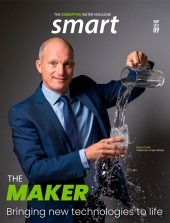Achieving the Sustainable Development Goals by 2030 is highly questionable, as the status quo is difficult to disrupt. Difficult, that is, but not impossible.
A report from 2019, “Digital With a Purpose: Delivering a Smarter2030”, authored by GeSI and Deloitte, framed the value of the information, communication technology (ICT) sector in achieving the SDGs. It is important to keep in mind that the value of ICT is not just in the more efficient use of resources such as water and energy or in reducing greenhouse gas emissions. It is in monitoring and transparently reporting progress to achieve the SDGs to diverse stakeholder groups such as non-governmental organizations, the public sector, private sector and civil society.
The report draws on input from academics, NGOs and more than 500 use cases, that if these technologies are deployed with positive societal impact in mind, they will help accelerate progress toward the SDGs by 22 percent and mitigate downward trends by 23 percent on average. The report identifies and quantifies how digital technologies can help governments, businesses and philanthropic organizations accelerate their efforts to achieve each of the 17 SDGs.
Seven digital technologies are broadly representative of the way digital capability will evolve in the medium term and for their critical influence on the world. These technologies include digital access, faster internet, cloud, the internet of things (IoT), cognitive, digital reality and blockchain. Of the 169 SDG targets, 103 are directly influenced by these technologies.
The value of ICT is not just in the more efficient use of resources such as water and energy or in reducing greenhouse gas emissions
A summary of the report’s findings, conclusions and recommendations is below:
- Digital technologies are capable of delivering transformative impact against each of the 17 UN Sustainable Development Goals (SDGs).
- Seven digital technologies could boost progress towards achieving the SDGs by more than 20 percent.
- By 2030 digital technologies will deliver reductions in carbon emissions equivalent to nearly seven times the size of the growth in the total ICT sector emissions footprint over the same period.
- Chief Information Officers have important role to develop and deploy technology with SDGs in mind.
The report further finds that by 2030 digital technologies will deliver reductions in carbon emissions equivalent to nearly seven times the size of the growth in the total information and communications technology (ICT) sector emissions footprint over the same period.
The report makes the case that current and emerging digital technologies can be leading contributors to positive societal value but will only become a reality if the focus on technological development and deployment is framed by a clear commitment to the SDGs. The authors of the report project that over $3 trillion is likely to be spent on research and development in the ICT sector in the ten years up to 2030, indicating huge potential for innovative solutions to the SDGs if effectively directed and as existing technologies mature.
SDG 6 and Digital Technologies
Of the 17 SDGs, SDG 6: “access to safe drinking water, sanitation and hygiene” is a cross cutting issue for nearly all of the SDGs. A study calling for cross cutting action on water to promote adaptation and the SDGs identified the SDGs that are closely linked to water: (1) No Poverty, (2) Zero Hunger, (7) Affordable and Clean Energy, (9) Industry, Innovation and Infrastructure, (13) Climate Action, 14) Life Below Water and 15) Life on Land. In our view water is also a critical issue for SDGs; (3) Good Health and Well-being, (4) Quality Education, (5) Gender Equality, (8) Decent Work and Economic Growth, (9) Industry, Innovation and Infrastructure, (10) Reducing Inequality, (11) Sustainable Cities and Communities, (12) Responsible Consumption and Production, (16) Peace, Justice, and Strong Institutions and (17) Partnerships for the Goals.
This makes ICT solutions a driving force in achieving the SDGs. Businesses and the public sector must now more efficiently and effectively manage that precious gallon or liter of water. As a result, digital technologies such as AI, IoT and remote sensing have an ever-increasing role to play in addressing water risks to business continuity and growth across their value chains. While the value of digital technologies has been clear and compelling the sense of urgency in adopting digital technologies in the private and public sectors could use greater amplification. Several reports over the past couple of years have been instrumental in advancing the adoption of digital water technologies. The groundwork for the digital transformation of water was captured in the World Economic Forum’s “Harnessing the Fourth Industrial Revolution for Water” report. Several recent reports highlight the ongoing digital transformation of water this year. In particular, the International Water Association and Xylem publication “Digital Water: Industry Leaders Chart the Digital Transformation”, as well as the report “Accelerating the Digital Water Utility”, focused on the water and wastewater utility sector and geographically focused digital water technology solutions. Another reference is “Digital Water Technology Solutions for the Colorado River Basin”, which Water Foundry published along with the Environmental Law Institute.
While more data has value, it is an incomplete value proposition. Data must be converted to actionable information and a unifying platform.
Case Study: ERAMOSA’s eRIS
Producing data is no longer the challenge; understanding the data is the struggle. In the business world data is traditionally housed in separate “silos”. When data are disconnected it is difficult, if not impossible to make sense of what it means and convert the data to actions. Enter a unifying water data platform, eRIS, developed by ERAMOSA, recently acquired by Westin Technology Solutions.
While more data has value, it is an incomplete value proposition; it must be converted to actionable information and a unifying platform
The eRIS platform unifies siloed data and delivers actionable information through mobile data entry and mobile and dashboard analytics. The platform connects to multiple data sources in real time, performs sophisticated calculations to add meaning and clarity to data and produces advanced reports on demand or at scheduled times. The value is created through the ability to visualize trends over time, comprehensively manage and analyze information for reporting, easily meet regulatory compliance requirements and understand operational performance as a basis for decision making.
eRIS turns an unscalable mountain of organizational data into a manageable asset that can be leveraged beyond its current uses. New technologies like artificial intelligence, machine learning, and advanced algorithms require well organized and validated inputs. The eRIS platform can provide a stream of normalized, organized, and validated data necessary for these advanced technologies to work efficiently. eRIS not only unlocks data from silos but unleashes it by normalizing and formatting it for sharing making collaboration using secure, information sharing a reality.
The ability to collect and analyze real time data and transform these data into actionable information provides public and private sector enterprises an unprecedented opportunity to manage water more efficiently and effectively, in a world of increasing water scarcity and poor quality, digital water solutions provide a pathway to achieve SDG 6 and contribute to the other SDGs.
Closing
The water sector was undergoing a digital transformation prior to the pandemic in 2019. The last plus has seen the accelerated adoption of digital water technologies such as the eRIS platform which solves one of the challenges in digital transformation: translating a wealth of data into actionable information through mobile data entry and mobile and dashboard analytics.
Analog is no longer an option. Digital is the only path forward if we are to manage water effectively for economic development, business growth, social well-being and ecosystem health.






